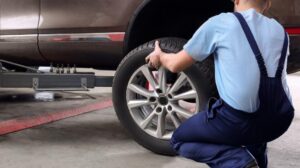As the winter season approaches, it’s important to take the necessary steps to ensure that your vehicle is prepared for the cold weather conditions. Winterizing your car not only helps to keep you safe on the road, but it also helps to maintain the longevity and performance of your vehicle. In this article, we will share some essential tips for winterizing your vehicle, including tire care, engine maintenance, and emergency kit essentials.
Tyre Care
One of the most important aspects of winterizing your vehicle is taking care of your tyres. Cold temperatures can cause the air pressure in your tyres to drop, which can affect your vehicle’s handling and fuel efficiency. Make sure to check your tyre pressure regularly and keep it at the recommended level. Additionally, consider switching to winter tyres, which provide better traction on snow and ice compared to all-season tyres.
Engine Maintenance
During the winter months, it’s crucial to ensure that your engine is in good working condition. Schedule a maintenance check-up with a qualified mechanic to perform a thorough inspection of your vehicle’s engine. They will check the battery, spark plugs, and other components to make sure everything is functioning properly. It’s also important to use the right type of oil for cold weather conditions, as it can help improve engine performance and fuel efficiency.
Fluid Check
Another important aspect of winterizing your vehicle is checking the fluid levels. Make sure to check the levels of your engine oil, coolant, and windshield washer fluid. It’s essential to use the appropriate fluids for cold weather conditions, as they are designed to withstand low temperatures and prevent freezing. If necessary, top up the fluids or have them changed by a professional.
Battery Health
The cold weather can put a strain on your vehicle’s battery, so it’s important to ensure that it’s in good health. Check the battery terminals for any signs of corrosion and clean them if necessary. If your battery is more than three years old or showing signs of weakness, consider replacing it to avoid any unexpected breakdowns during the winter season.
Emergency Kit Essentials
Preparing an emergency kit is essential for winter driving. Your kit should include items such as a flashlight, extra batteries, jumper cables, a first aid kit, a warm blanket, a snow shovel, and non-perishable snacks. It’s also a good idea to have a fully charged mobile phone and a portable phone charger in case of emergencies. Remember to check your kit regularly and replace any expired items.
Conclusion
Winterizing your vehicle is a crucial step in ensuring your safety and the longevity of your car during the cold weather months. By following these essential tips, including tire care, engine maintenance, and having an emergency kit, you can have peace of mind knowing that you are prepared for any winter driving conditions that may come your way. Stay safe on the road and enjoy the winter season!




